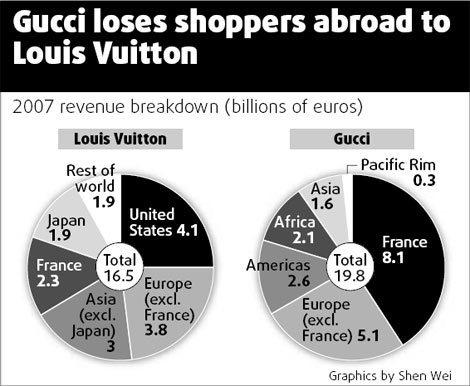
|
WORLD> Global General
 |
|
Gucci loses out to Vuitton as fashion cache fades
(Agencies)
Updated: 2008-07-24 07:48 Gucci, the biggest money maker for Paris-based retailer PPR SA, may report a 5.8 percent increase in second-quarter sales after losing customers in the first three months of this year to luxury rivals it had outperformed for three years. The return of profit momentum doesn't necessarily mean a revival in the label's cachet. Rita Clifton, chairman of London-based Interbrand consulting company, said Gucci may be squandering its high-end credentials for more mainstream growth. "There's a real danger zone at Gucci at this moment," Clifton said. "It's easy in these high-pressure times to drive growth by keeping your foot on the accelerator, but they've got to make sure they keep reinvesting in top-end luxury." Gucci, the industry's "it" brand in the 1990s under designer Tom Ford and former Chief Executive Officer Domenico De Sole, increased sales by 46 percent from 2004 to 2007, even after the departure of the high-profile leaders. Since then, Gucci has been "coasting on good will", Washington Post fashion critic Robin Givhan said in a interview.  With the slowdown in US consumption, Gucci's flaws are beginning to show, Givhan said, adding that the label has "lost its personality". Gucci's first-quarter sales growth slowed to 2.5 percent from 11 percent in the fourth quarter. US sales decline Since February, sales at US luxury department stores had an average monthly decline of 2.7 percent compared with the previous year, according to a July 10 report from the International Council of Shopping Centers. In 2007, luxury sales rose 6.3 percent. Gucci competitor LVMH Moet Hennessy Louis Vuitton SA, on the other hand, benefited from having a third of its sales in Asia, where spending on luxury goods in countries excluding Japan is increasing 20 percent to 30 percent, according to Armando Branchini, vice president of Interbrand in Milan. PPR generates two-thirds of its revenue in Europe. It has 16 stores in China and plans open several more this year. "Gucci has disappointed the market and LVMH has surprised," said Scilla Huang Sun, who runs a luxury fund for Julius Baer Holding AG in Zurich. Julius Baer cut its stake in PPR by 25 percent this year, while buying LVMH, the world's biggest luxury-goods maker. Gucci accounts for 36 percent of PPR's operating profit and 11 percent of sales. Deutsche Bank AG and Goldman, Sachs & Co. lowered profit estimates and stock recommendations July 10 on concern demand was weakening. Merrill Lynch cut PPR's price target by 19 percent to 69 euros and lowered its profit forecast 1 percent to 7.44 euros a share July 21. Analysts estimate a 4 percent increase in PPR's 2008 earnings per share, compared with estimates of a 7 percent rise at LVMH, based on data compiled by Bloomberg. PPR shares, which closed at 63.28 euros yesterday, have dropped 42 percent this year. LVMH fell 19 percent in the same period. A recent effort by Gucci to design a lower-priced handbag to compete with Vuitton's Neverfull tote also gave a down-market image to the brand, critics said. Canvas GG Joy purses and bags, introduced last year, are emblazoned with printed GG logos and cost about 350 euros for a small doctor-bag model. "The bags look like something you'd see on Canal Street peddled by a counterfeiter," said Givhan, referring to New York City's marketplace for copycat designer goods. She said the line recalls Gucci of the 1980s when the brand suffered from over-expansion. LVMH reported a 5.3 percent increase in revenue in the first quarter, driven by 7 percent sales growth in its fashion and leather goods unit that includes Louis Vuitton. HSBC analyst Antoine Belge estimates Louis Vuitton sales rose 13 percent in the second quarter and will gain 12 percent this year. LVMH reports second-quarter sales on July 29. Gucci Group NV Chief Executive Officer Robert Polet, who oversees Gucci and eight other brands, stands by his goal of doubling Gucci's revenue to 3 billion euros by 2011. "There is no proverbial milking of the cow," Gucci's CEO Mark Lee said in an interview. "The dream of Gucci is very much alive."
|